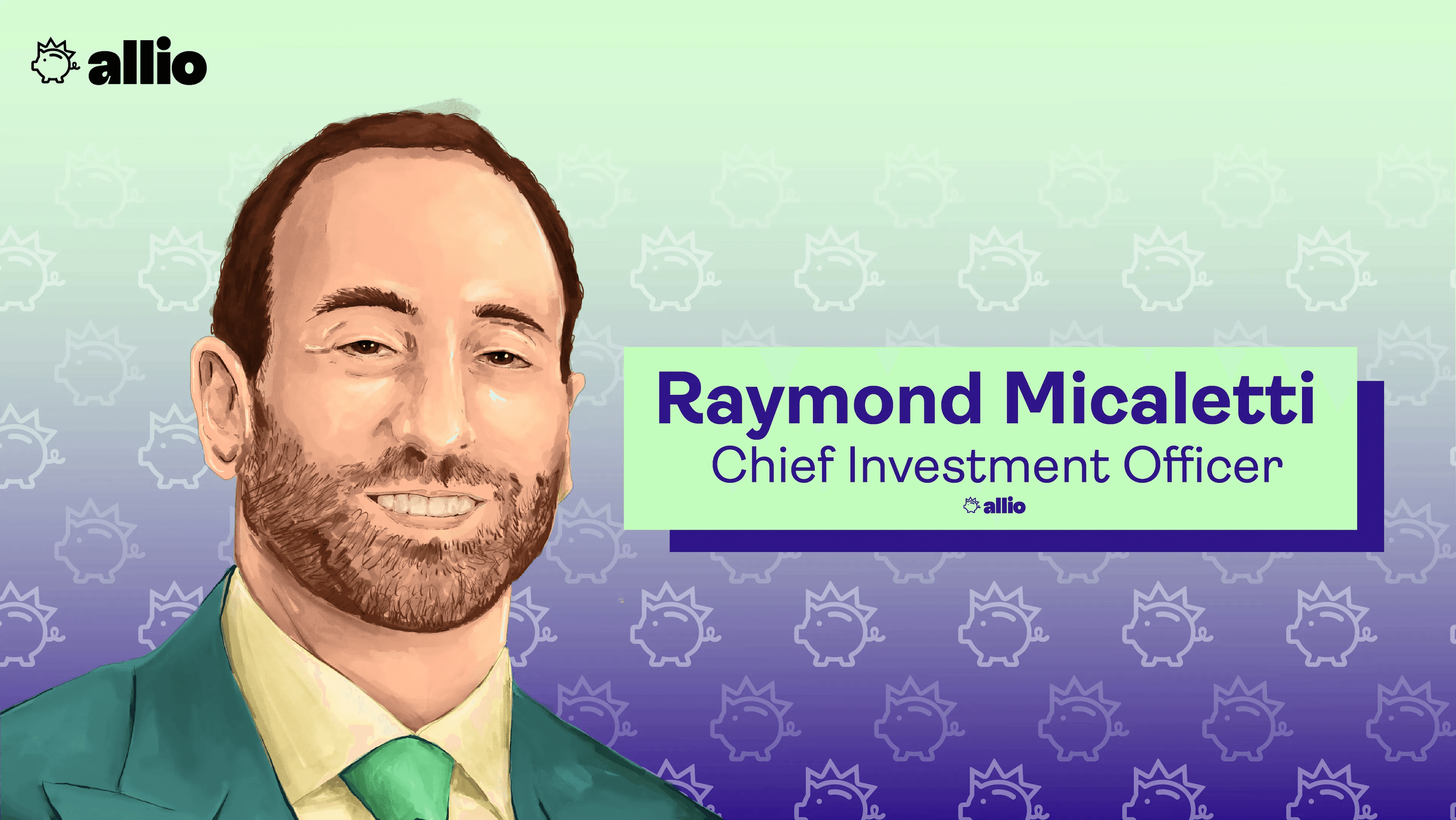Updated April 24, 2023

Raymond Micaletti, Ph.D.
Alpha

As Allio’s Chief Investment Officer, you lead the creation of client portfolios. How does your strategy differ from what’s currently available from other robo-advisors?
In general, robo-advisors tend to offer portfolios that consist of only equities and bonds. The problem with that approach, however, is that during secular periods of high inflation (such as the one we believe we’re in currently), the correlation between equities and bonds becomes positive, thus reducing any diversification benefits from holding both equities and bonds.
Our approach is to offer our clients a portfolio that has asset classes beyond just equities and bonds, including real assets such as gold, commodities, energy stocks, and real estate–i.e., assets one would expect to outperform during inflationary secular regimes. We also offer smart beta and alternative investments along with cryptocurrency.
Moreover, our methods of portfolio construction go beyond simple mean-variance optimization, which may not be appropriate for multi-asset class portfolios such as the ones we offer due to some of the assets having markedly “fat-tailed” return distributions. Instead, we use full-scale optimization, which allows for probabilistic correlations, a flexible objective function, and a focus on building portfolios that tend to be more resilient to downside market movements than those produced by mean-variance optimization.
When you first signed on with Allio we were still in a strong bull market. Allio is now set to launch in a period marked by wild stock market fluctuations, record inflation, and potentially a recession. How did your investment strategy change to meet the moment?
Our overarching philosophy, framework, and process remain the same. But the models that we use to generate the inputs to our portfolio construction process—models grounded in theory and (more importantly) validated by empirical observations and history—adapt to the environment we are in.
For example, as mentioned above, correlations between equities and bonds have gone positive since the end of the March 2020 COVID-induced selloff in global equities. As a result, this environment (with respect to equity-bond correlations) is similar to the period between 1965 and 2000.
If, like many analysts, we were using only 5-10 years of history to establish our inputs, we might (erroneously) continue to expect equity and bond correlations to be negative (because they were negative from March 2000 to March 2020).
Instead, we have a solid understanding of secular market regimes, how different asset classes behave in those regimes, how long they typically last, and the signposts that confirm or negate our working hypothesis. Our models take all of these considerations into account when generating our long-term asset class forecasts.
In addition to being Allio’s CIO, you’re also President and CIO of Relative Sentiment Technologies and have your own ETF. How does the work you do with Allio complement Relative Sentiment, and vice versa?
At Allio, we offer portfolios constructed from the perspective of strategic asset allocation—that is, the portfolios are built with longer-term (e.g. multi-year) considerations in mind—to reduce turnover and lessen tax consequences.
In contrast, at Relative Sentiment Technologies our focus is primarily on tactical asset allocation—i.e., we try to answer the question, “Where is the market likely to go over the next few weeks and months?” and then allocate to equities, bonds, and gold accordingly over those shorter time frames. We do this by looking at how institutions are positioned in the market relative to retail traders—because the market tends to move in the direction that institutions are forecasting.
That being said, prior to focusing on tactical asset allocation, I spent more than a half-decade working on shorter-term strategies (ones with holding periods of 1-5 days). Eventually, insights on how markets behaved from those shorter-term strategies informed my tactical strategies, which, in turn, have informed my construction of longer-term multi-asset class portfolios.
The culmination of this experience, creating strategies across different time horizons, has helped provide context as to how the market is likely to behave over the next week, month, or even decade.
You have over 20 years of experience in finance and have worked at major investment banks, hedge funds, and asset management firms. Given your experience, what’s one piece of advice you would give to others just starting out in finance?
Finance is a turbulent industry and also one that is continually ripe for disintermediation by disruptive technology. Thus, if you happen to find yourself in a position that seems cozy and without competition, always remember that competition is tenaciously trying to find you. So always maintain and expand your skill set, curate a strong network of contacts, and save and invest your money wisely—because you never know when you might find yourself in between jobs.
Ready to experience the next generation of finance? Head to the app store and download Allio today!
Related Articles
The articles and customer support materials available on this property by Allio are educational only and not investment or tax advice.
If not otherwise specified above, this page contains original content by Allio Advisors LLC. This content is for general informational purposes only.
The information provided should be used at your own risk.
The original content provided here by Allio should not be construed as personal financial planning, tax, or financial advice. Whether an article, FAQ, customer support collateral, or interactive calculator, all original content by Allio is only for general informational purposes.
While we do our utmost to present fair, accurate reporting and analysis, Allio offers no warranties about the accuracy or completeness of the information contained in the published articles. Please pay attention to the original publication date and last updated date of each article. Allio offers no guarantee that it will update its articles after the date they were posted with subsequent developments of any kind, including, but not limited to, any subsequent changes in the relevant laws and regulations.
Any links provided to other websites are offered as a matter of convenience and are not intended to imply that Allio or its writers endorse, sponsor, promote, and/or are affiliated with the owners of or participants in those sites, or endorses any information contained on those sites, unless expressly stated otherwise.
Allio may publish content that has been created by affiliated or unaffiliated contributors, who may include employees, other financial advisors, third-party authors who are paid a fee by Allio, or other parties. Unless otherwise noted, the content of such posts does not necessarily represent the actual views or opinions of Allio or any of its officers, directors, or employees. The opinions expressed by guest writers and/or article sources/interviewees are strictly their own and do not necessarily represent those of Allio.
For content involving investments or securities, you should know that investing in securities involves risks, and there is always the potential of losing money when you invest in securities. Before investing, consider your investment objectives and Allio's charges and expenses. Past performance does not guarantee future results, and the likelihood of investment outcomes are hypothetical in nature. This page is not an offer, solicitation of an offer, or advice to buy or sell securities in jurisdictions where Allio Advisors is not registered.
For content related to taxes, you should know that you should not rely on the information as tax advice. Articles or FAQs do not constitute a tax opinion and are not intended or written to be used, nor can they be used, by any taxpayer for the purpose of avoiding penalties that may be imposed on the taxpayer.